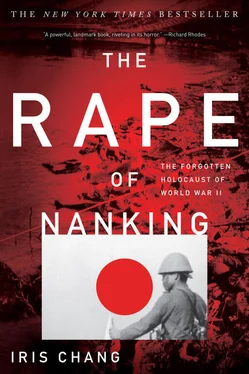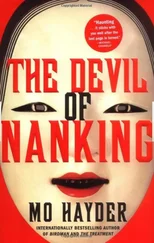By the 1920s young radicals in the Japanese army were arguing that military expansion was crucial to the country’s survival. In his book Addresses to Young Men, Lieutenant Colonel Hashimoto Kingoro wrote:
There are only three ways left to Japan to escape from the pressures of surplus population… emigration, advance into world markets, and expansion of territory. The first door, emigration, has been barred to us by the anti-Japanese immigration policies of other countries. The second door… is being pushed shut by tariff barriers and the abrogation of commercial treaties. What should Japan do when two of the three doors have been closed against her?
Other Japanese writers pointed to the spacious territories of other countries, complaining about the injustice of it all, especially since these other countries were not making the most of their land by achieving the high per-acre yields that Japanese farmers had obtained. They looked enviously upon not only China’s vast land resources but those of Western countries. Why, the military propagandist Araki Sadao asked, should Japan remain content with 142,270 square miles, much of it barren, to feed 60 million mouths, while countries like Australia and Canada had more than 3 million square miles to feed 6.5 million people each? These discrepancies were unfair. To the ultranationalists, the United States enjoyed some of the greatest advantages of all: Araki Sadao pointed out that the United States possessed not only 3 million square miles of home territory but 700,000 square miles of colonies.
If expansion westward to the Pacific Ocean was the manifest destiny of the nineteenth-century United States, then China was twentieth-century Japan’s manifest destiny. It was almost inevitable that this homogenous people of high personal esteem would see the socially fragmented and loosely governed expanse of China as having been put there for their use and exploitation. Nor were Japan’s covetous intentions limited only to Asia. In 1925, just a short three years after Japan entered into a capital ship limitation treaty with the United States, Great Britain, France, and Italy that afforded it a distinctive role as the world’s third largest naval power, Okawa Shumei, a national activist, wrote a book that insisted not only on Japan’s destiny to “free” Asia but also on the inevitability of world war between Japan and the United States. In the concluding chapter of his book, he was more prophetic than he realized when he predicted a divine—almost apocalyptic—struggle between the two powers: “Before a new world appears, there must be a deadly fight between the powers of the West and the East. This theory is realized in the American challenge to Japan. The strongest country in Asia is Japan and the strongest country that represents Europe is America…. These two countries are destined to fight. Only God knows when it will be.”
By the 1930s the Japanese government found itself mired in intrigue as those who favored using Japan’s newly acquired technological skills to build a better society competed for influence with those who wanted to use the nation’s military superiority over its neighbors to embark on a program of foreign conquest. Expansionist ideologies gained fervent support from right-wing ultranationalists, who called for a military dictatorship that would limit personal wealth, nationalize property, and dominate Asia. These ideas fueled the ambitions of junior military officers, whose rural backgrounds and youth made them naturally distrustful of Tokyo politicians as well as impatient for immediate access to power. Though the officers feuded among themselves, they shared a similar mission: to overhaul society and eliminate all bureaucratic, economic, and political obstacles to what they believed to be Japan’s divine mission to avenge itself against the Europeans and dominate Asia.
Step by step, the interventionists forced a series of compromises from the moderate elements in government. But disappointed by the pace of change, they began to conspire among themselves to topple the government. In 1931 a coup was planned but abandoned. In 1932 a group of naval officers launched a terrorist attack in Tokyo that killed Prime Minister Inukai Tsuyoshi but failed to secure martial law.
On February 26, 1936, a clique of young officers launched a bold coup d’état that took the lives of several statesmen. Though the coup paralyzed downtown Tokyo for more than three days, it ultimately failed and the ringleaders were jailed or executed. Power shifted from the extremists to a more cautious faction within the government, though it is important to point out that even this faction shared many of the young officers’ fanatical views when it came to Japan’s right to a dominant role in Asia.
It soon became apparent to some Japanese ultranationalists that if they wanted to control China they would have to move fast. For there were signs that China, forced to submit to Japanese demands in 1895, was trying to strengthen itself as a nation—signs that gave the Japanese expansionists a sense of urgency in their mission.
China had indeed used the past two decades to transform itself from a disintegrating empire into a struggling national republic. In 1911 rebel armies defeated the Qing imperial forces and ended more than two centuries of Manchu rule. During the 1920s the Nationalists under Chiang Kai-shek successfully fought the warlords of northern China to unify the country. They also announced as a goal the elimination of unfair treaty agreements foisted upon the Qing dynasty by foreign powers. As Chiang’s movement gained momentum, it threatened Japanese interests in Manchuria and Mongolia. Something had to be done, and quickly, before China grew too powerful to be conquered.
With the approval of the Japanese government, the military began to intervene more aggressively in Chinese affairs. In 1928 they engineered the assassination of Chang Tsolin, the warlord ruler of Manchuria, when he failed to give them his full cooperation. The murder only served to infuriate the Chinese people, who organized more boycotts against Japanese goods.
By the 1930s Japan had launched an undeclared war with China. On September 18, 1931, the Japanese army blew up the tracks of a Japanese-owned railway in southern Manchuria, hoping to incite an incident. When the blasts failed to derail an express train, the Japanese killed the Chinese guards instead and fabricated a story for the world press about Chinese saboteurs. This incident gave the Japanese an excuse to seize Manchuria, which was renamed Manchukuo and where the Japanese installed Pu Yi, the last emperor of China and heir of the Manchu dynasty, as puppet ruler. The seizure of Manchuria, however, generated anti-Japanese sentiment in China, which was whipped up by Nationalist activists. Feelings ran high on both sides and erupted in bloodshed in 1932 when a Shanghai mob attacked five Japanese Buddhist priests, leaving one of them dead. Japan immediately retaliated by bombing the city, killing tens of thousands of civilians. When the slaughter at Shanghai aroused worldwide criticism, Japan responded by isolating itself from the international community and withdrawing, in 1933, from the League of Nations.
To prepare for the inevitable war with China, Japan had spent decades training its men for combat. The molding of young men to serve in the Japanese military began early in life, and in the 1930s the martial influence seeped into every aspect of Japanese boyhood. Toy shops became virtual shrines to war, selling arsenals of toy soldiers, tanks, helmets, uniforms, rifles, antiaircraft guns, bugles, and howitzers. Memoirs from that time describe preadolescent boys waging mock battles in the streets, using bamboo poles as imaginary rifles. Some even tied logs of wood on their backs and fantasized about dying as “human bomb” heroes in suicide missions.
Читать дальше











